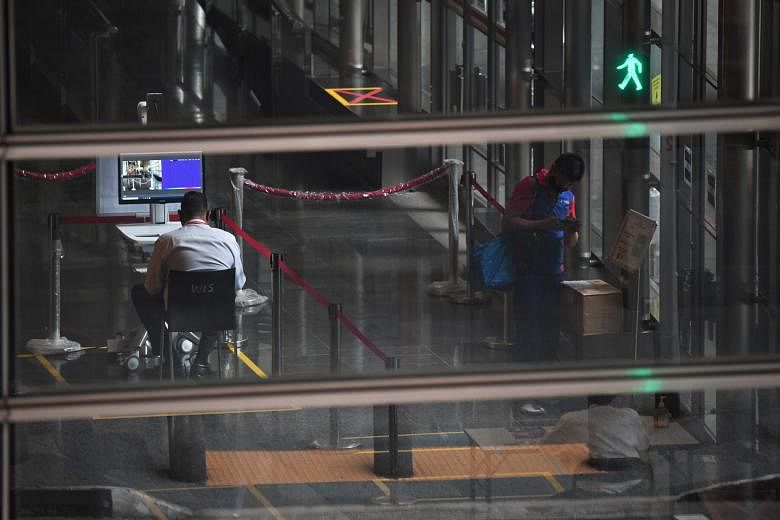Mr Mohamed Sameer, a 30-year-old junior officer on a ship, spends two weeks out at sea before returning to shore for two weeks of rest.
He wants to use those two weeks of downtime to supplement his income by working as a relief security guard for eight days, earning about $100 to $120 daily.
But he has to undergo training first and must complete three modules: threat observation (recognise terrorist threats); guard and patrol (provide guard and patrol services); and incident response (handle security incidents and services).
The modules, which take between seven and eight days to complete, were the three most popular for the first half of this year, said SkillsFuture Singapore.
Many of the course participants contacted by The Straits Times had full-time jobs, but they said the training to be a security guard was a back-up plan in case of a job loss, or as a way to supplement their income amid the surge in demand for security officers during the Covid-19 pandemic.
Having more people training to be security officers will help in meeting the rise in demand, said president of the Security Association Singapore (SAS), Mr Raj Joshua Thomas.
He is, however, unconvinced if many of those trained would remain in the industry.
"In the longer term, we expect that these new entrants will move on to other jobs as the economy recovers. In this regard, in terms of career building and professionalism, this is not a good trend," he said.
Mr Sameer, for example, is not looking for a full-time job in the security industry.
"If it's a more senior position, maybe I'll consider it, but it depends on the salary too," he said, noting that the typical monthly wage for a security officer is far lower than that of a ship's junior officer.
Under the Progressive Wage Model, security officers of the lowest rank must be paid a basic salary of at least $1,250 a month. This increases to at least $1,820 a month for a senior security supervisor.
To encourage more people to enter the security sector, some industry players have called for allowing job seekers to defer training for positions at non-sensitive sites.
Mr William Adam Morton Jr, director of Keith Morton Security, in a letter to The Straits Times Forum page last month, said this would lead to officers being immediately employed on a temporary basis.
They would be given a grace period of six months after recruitment to attend the necessary training, he wrote.
Speaking to The Straits Times last week, Mr Morton said the non-sensitive locations could include construction sites "where the security just sits there and takes the temperatures of people who are going in".
"Any ordinary man can do that. As long as they are screened and they have no criminal convictions, why not," he said.
Responding to the suggestion, Mr Thomas said the position of the SAS is that training is essential for a security officer to carry out his duties effectively.
Mr Sameer, who has completed two of the three modules so far, appears to agree, saying that he found the training useful thus far.
"Whenever there's an incident, for example, if there's a fire in a shopping mall, ultimately, the first responders are security guards who will be the ones to guide you to the exit," he added.
Correction note: This story has been updated with the latest basic wage floors under the Progressive Wage Model for the security industry.












